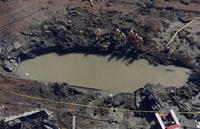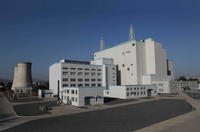-
The Geophysicist's Guide to Striking It Rich
Prospecting — the search for valuable reserves such as gold, diamonds, and natural gas — is not just a matter of luck; it is about knowing where to look; now researchers at Tel Aviv University have modernized the hit-or-miss search with advanced technology that scans the earth for signs of lucrative resources that could lurk beneath the surface
-
-
Report finds poor management cause of San Bruno natural gas explosion

An investigation into the cause of a natural gas pipeline explosion that killed eight people and destroyed dozens of homes in San Bruno, California, placed the blame squarely on fifty-four years of bad management by Pacific Gas & Electric Company (PG&E) and the failure of state and federal regulators to notice the problem
-
-
Breakthrough in hydrogen fuel cells

Hydrogen makes a great fuel because it can be converted easily to electricity in a fuel cell and because it is carbon free; the downside of hydrogen is that, because it is a gas, it can only be stored in high pressure or cryogenic tanks; a team of USC scientists has developed a robust, efficient method of using hydrogen as a fuel source
-
-
U.S. makes nuclear fuel available to other countries
The United States announced the availability of a reserve stockpile of low-enriched uranium (LEU) for use in nuclear fuel; the LEU is derived from down-blended surplus military material; the LEU will be made available to countries interested in nuclear power generation, thus making it unnecessary for these countries to develop their own uranium-enrichment technology
-
-
Thermopower waves advance a new energy future
Thermopower waves in thermoelectric materials can convert heat from solid fuels into electrical energy, in research that advances the vision of “smartdust” and other truly autonomous micro and nanomachines; “smartdust” systems are micro-electromechanical systems that are networked wirelessly for sensing and receiving data, for example testing pH of soil in large agricultural fields or quality of water reserves
-
-
Bacteria--Energy Producers of the Future?
A lot of the water we use daily goes to waste — whether it goes down drains, sewers, or toilets, much of it ends up at a wastewater treatment plant where it undergoes rigorous cleaning before it flows back to the environment; researchers are looking at processes which would turn wastewater into energy
-
-
Tap water in Copenhagen contaminated with E.coli
Parts of the Danish capital Copenhagen were without clean drinking water Saturday after high levels of the E.coli bacteria were detected in the municipal tap water system
-
-
Cleaning water while generating energy
A fuel cell system that can generate electricity from organic compounds and clean up wastewater at the same time has been developed by scientists in China; the cell uses light energy to degrade organic compounds in wastewater, generating electrons that pass through to the cathode, which converts the chemical energy into electrical energy
-
-
Day of "solar" soldiers nears

Researches develop wearable light-weight solar panels which will allow soldiers to generate power in the field and reduce the need for batteries for their electronic devices; they will also establish a power supply that keeps electronic devices operational throughout the duration of missions
-
-
Storing CO2 underground to extract electricity
A team of scientists, led by the Berkeley Lab, hopes to become the first in the world to produce electricity from the Earth’s heat using CO2; They also want permanently to store some of the CO2 underground, where it can not contribute to climate change
-
-
Market forces to help reduce emission, increase storage of CO2
New computer modeling work shows that by 2100, if society wants to limit carbon dioxide in the atmosphere to less than 40 percent higher than it is today, the lowest-cost option is to use every available means of reducing emissions — including using forests to store carbon
-
-
A first: China connects fast-neutron reactor to the grid

Fast-neutron reactors use uranium sixty times more efficiently than a normal reactor; if adopted, the reactors would make current uranium reserves go longer; the reactor design also minimizes radioactive waste from nuclear energy; China is the first country to connect a fast-neutron reactor to its grid
-
-
U.S. shale gas weakening Russian, Iranian petro-power
Rising U.S. natural gas production from shale formations has already played a critical role in weakening Russia’s ability to wield an “energy weapon” over its European customers, and this trend will accelerate in the coming decades
-
-
Mathematical framework converts junk energy into useful power

Researchers have developed a mathematical framework that could one day form the basis of technologies that turn road vibrations, airport runway noise, and other “junk”energy into useful power;
-
-
Placement of wind-turbine increases power tenfold

The power output of wind farms can be increased by an order of magnitude — at least tenfold — simply by optimizing the placement of turbines on a given plot of land; rather than build taller towers and bigger blades, efficient wind-based energy production should focus on the design of the wind farm itself, to maximize its energy-collecting efficiency at heights closer to the ground
-
- All
- Regional
- Water
- Biometrics
- Borders/Immig
- Business
- Cybersecurity
- Detection
- Disasters
- Government
- Infrastructure
- International
- Public health
- Public Safety
- Communication interoperabillity
- Emergency services
- Emergency medical services
- Fire
- First response
- IEDs
- Law Enforcement
- Law Enforcement Technology
- Military technology
- Nonlethal weapons
- Nuclear weapons
- Personal protection equipment
- Police
- Notification /alert systems
- Situational awareness
- Weapons systems
- Sci-Tech
- Sector Reports
- Surveillance
- Transportation
Advertising & Marketing: advertise@newswirepubs.com
Editorial: editor@newswirepubs.com
General: info@newswirepubs.com
2010-2011 © News Wire Publications, LLC News Wire Publications, LLC
220 Old Country Road | Suite 200 | Mineola | New York | 11501
Permissions and Policies
Editorial: editor@newswirepubs.com
General: info@newswirepubs.com
2010-2011 © News Wire Publications, LLC News Wire Publications, LLC
220 Old Country Road | Suite 200 | Mineola | New York | 11501
Permissions and Policies
